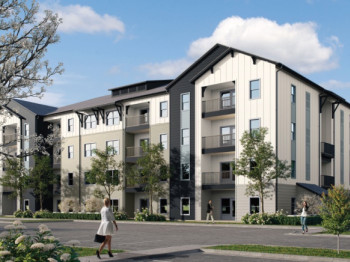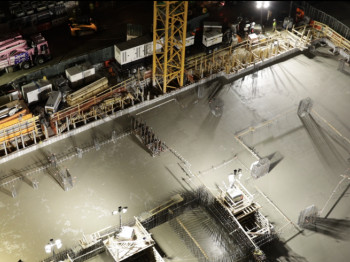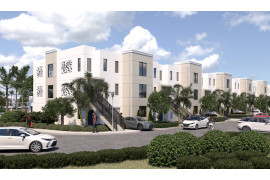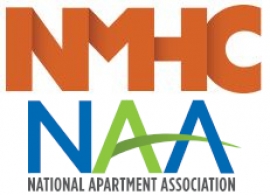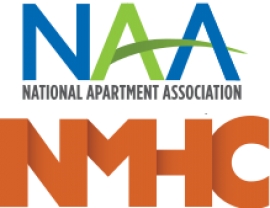Trending Multifamily News
As COVID still has its grips on the country, Apartmentalize will be shifting by 2 1/2 months to August 31 - September 2.
In-person meetings, travel and fun are all making a comeback in 2021 and to accomplish all of that, we are postponing the 2021 Apartmentalize to August 31 – September 2, 2021. With an extra 2 ½ months, we know even more of you will be able to reconnect, restart and reenergize at the largest gathering in the rental housing industry.
Starting on Tuesday, Aug. 31, Apartmentalize will begin at noon and end at 2:30 p.m. on Thursday, Sept. 2. That means you’ll be able to get home in time for your Labor Day weekend plans or extend your trip and spend the holiday weekend exploring Chicago!
Details about the change can be found here: https://www.naahq.org/2021-apartmentalize
The National Multifamily Housing Council (NMHC) and the National Apartment Association (NAA) appreciate President Biden’s prompt and well-intended action to address the ongoing financial struggle of our nation’s 40 million renters.
However, NMHC and NAA continue to raise serious concerns about eviction moratoriums because they do not address underlying financial distress and leave households accumulating insurmountable levels of debt.
We remain heartened by President Biden’s recently announced relief proposal, the “American Rescue Plan,” which includes additional unemployment benefits, increased stimulus checks and an additional $25 billion in rental assistance. These measures will continue to support those households and apartment owners and operators who are unable, through no fault of their own, to meet their financial obligations.
We are deeply concerned that the President’s rescue package includes a 9-month eviction moratorium in addition to the CDC Order extension enacted today. Such policies have been in place for nearly a year while targeted, direct rental assistance took nine months to pass Congress.
Even so, allocated rental assistance funds do not fully address the $70 billion in outstanding debt nor accruing debt moving forward. The industry simply cannot continue operation under these policies without disastrous harm to housing affordability.
We look forward to working together with the Biden Administration and Congress to provide the additional financial support needed to help close the growing gap of tens of billions in rental debt that accumulated in 2020. Additional financial support is urgently needed to prevent displacement, stabilize millions of Americans who continue to struggle under the weight of COVID-19 financial impacts and ensure rental housing providers can continue operations and keep their residents stably housed.
|
The National Multifamily Housing Council (NMHC) and the National Apartment Association (NAA) applaud the Trump administration’s signing of an Executive Order directing agencies to use emergency authorities to identify regulations that can be rescinded or temporarily waived to encourage economic growth and recovery from the effects of COVID-19. Time and again, regulations have proven detrimental to housing affordability and efforts to address our nation’s housing supply shortage.
Prior to the onset of the COVID-19 pandemic, our nation was already facing a housing affordability crisis brought on by a housing supply shortage and insufficient infrastructure. Rising costs and regulatory burdens at all levels of government depress apartment development and rehabilitation nationwide. The NAA Barriers to Construction Index cites numerous regulations, including those dictating land usage and environmental considerations, as key factors harming apartment construction. And, research by NMHC and the National Association of Home Builders (NAHB) found that regulations imposed by all levels of government account for an average of 32.1 percent of multifamily development costs. Easing burdensome regulations will encourage apartment construction, which ultimately helps housing affordability.
Lawmakers should also enact policies to expand and diversify the creation and renovation of housing throughout the country. Doing so now ensures the housing affordability crisis the country was already grappling with before COVID-19 is not made worse by the pandemic. Moreover, robust housing development and rehabilitation can help drive the nation’s economic recovery – apartment construction contributes $150.1 billion to the national economy annually and creates 752,000 jobs, while renovation contributes an additional $69 billion and creates 340,000 jobs.
NMHC and NAA support the Administration’s efforts to reform the regulatory apparatus and spur economic growth and job creation. Prior to the introduction of this EO, NMHC and NAA had been in regular communication with Administration officials regarding reducing regulation – including taking part in a November 2019 roundtable at the White House Council on Eliminating Regulatory Barriers to Affordable Housing.
NMHC and NAA look forward to continuing to work with the Trump Administration on this important measure that will help spur economic growth and job creation.
More resources on COVID-19 from NMHC and NAA can be found here and here.
|
The National Apartment Association (NAA) and the National Multifamily Housing Council (NMHC) today released the apartment housing industry’s policy priorities for 2019-2020.
It’s no secret that a growing number of families across the income spectrum are struggling to find housing they can afford. As a country, we need comprehensive, proactive policy solutions that can help to mitigate this housing affordability crisis. As such, NAA/NMHC have made this the lodestar of our advocacy efforts in 2019-2020.
“We’ve identified the issue of housing affordability as a top priority for 2019 because it is wide-reaching and impacts communities around the country,” said NAA President and CEO Robert Pinnegar, CAE.
“There is a growing concern at all levels of government about how to best deal with housing affordability issues,” said Doug Bibby, NMHC President. “It’s incumbent upon us as an industry to do our utmost to work with lawmakers to find holistic policy solutions that provide the housing our nation needs.”
One critical driver of the housing affordability crisis is the cost of local, state and federal regulations. Recent research has found that such regulations account for an average of 32.1 percent of rental housing development costs – driving up the price tag to create adequate housing options for all incomes. In 2019 and 2020, NAA/NMHC will advocate for a reduction of unnecessary, harmful barriers to the development of more housing and preservation of existing apartments.
In addition to the cost of regulation, there are many other policies and programs that impact affordability. Getting housing finance reform right is a critical component of addressing housing affordability. In addition, the Section 8 Housing Choice Voucher Program is an important tool designed to assist families in need of affordable housing. We are working on proposals that will enhance the Section 8 federal housing program and incentivize additional private sector participation.
In addition to housing affordability and regulatory reform, NAA/NMHC will also focus on other critical federal legislative and regulatory issues. These include the ongoing implementation of the 2017 tax law, clarification of fair housing rules, rent payments in credit scoring, data security standards, federal flood insurance reauthorization, construction and development incentives, accessibility litigation and music licensing reforms.
The full NAA/NMHC 2019 Apartment Industry Policy Priorities document can be found at NAA and NMHC.
Statement from the National Multifamily Housing Council (NMHC) and the National Apartment Association (NAA) in response to President Trump’s State of the Union address:
“On behalf of the apartment industry, the 39 million Americans who call apartments home and the 12.3 million whose jobs are supported by the industry, we applaud President Trump and his administration’s focus on economic growth and job creation through infrastructure development, the ongoing federal regulatory overhaul and the recently reformed tax code.
“Last night the President made it clear that infrastructure is a top priority this year. As lawmakers develop legislation, NMHC/NAA are focused on ensuring that housing and local infrastructure that impact the cost of housing are key components of any infrastructure package. With housing demand continuing to grow, policymakers must take advantage of this moment to drive new residential investment, support community-level infrastructure and promote transit-oriented and high-density development.
“By 2030, there will be 94 million more people in the U.S. than there were in 2000. All of these people need somewhere to live and work. Last year’s tax reform package and the overhaul of the federal regulatory landscape go a long way towards protecting and enhancing the multifamily industry’s ability to serve the millions of Americans who live in apartments.
“We look forward to working with the administration and policymakers on a job-creating infrastructure package that helps the multifamily industry build the 4.6 million new units that are needed to meet surging demand.”
Statement from the National Multifamily Housing Council (NMHC) and National Apartment Association (NAA) following the release of tax reform legislation by the House Ways and Means Committee.
“NMHC/NAA applaud the House Ways and Means Committee release of tax reform legislation. While we are continuing to review the legislative language, the tax reform package, as currently written, looks to encourage economic growth and job creation while protecting the multifamily industry’s ability to serve the 39 million Americans who call apartments home and the 12.3 million jobs supported by the multifamily sector and its residents. Critically, the Tax Cuts and Jobs Act would preserve interest deductibility, like-kind exchanges and other provisions important to the apartment industry.
“There is a long process ahead before tax reform becomes law. As the debate continues, we will continue to work with lawmakers to highlight the importance of the multifamily industry and emphasize how tax reform is critical to developing the 4.6 million more apartments that the country will need by 2030. As tax reform legislation is considered in both houses of Congress, it is critical that any final bill should:
- Protect flow-through entities;
- Retain the deduction for business interest;
- Maintain like-kind exchanges;
- Ensure depreciation rules avoid harming real estate;
- Preserve capital gains treatment of carried interest; and,
- Protect the Low-Income Housing Tax Credit (LIHTC).”
More information about apartments and tax reform is available at protectthelease.com.

